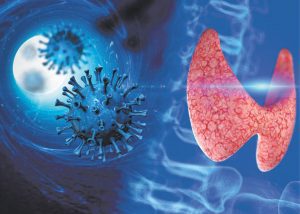By Dr. Melissa (Mel) Irvine, DNP – Clinical Sexologist
Specializes in Sexual Medicine and Beauty


However, as research surrounding COVID-19 grows, scientists are finding that this virus may be affecting the body in more ways than we initially suspected, including an impact on our hormone levels.
COVID-19 is not the only infection to show a connection with hormones. For example, hormone dysfunction that results in menstruation abnormalities, early menopause, and miscarriage has also been documented with Hepatitis B and C and HIV infections.
It is suspected that this hormonal dysfunction occurs because the viruses cause multisystem disruption, although it may also result from organ-specific effects.
COVID-19’s Effect on the Endocrine System
The endocrine system consists of the glands that produce hormones responsible for tissue growth, metabolism, and reproduction, among many other roles. When the body needs a hormone for a specific function, the gland signals for the release of it.
However, COVID-19 may affect the endocrine system, disrupting hormone production. It can accomplish this by using angiotensin-converting enzyme 2 (ACE2) to infiltrate host cells. While COVID-19 most often penetrates cells in the lungs, it also shows the potential to enter any cell with ACE2 expression, which includes some endocrine glands.
There are five primary endocrine glands that may be susceptible to damage from COVID-19. Let’s discuss each gland and what its dysfunction means for your body.
Pancreas
The pancreas is the gland responsible for producing insulin, which helps the cells of the body take in and use blood sugar for energy. When insulin is not produced or does not work correctly, blood sugar levels can rise.
Any major illness can be associated with stress-related high blood sugar. Still, studies have reported that patients with SARS, a close variant of coronavirus, who had never received glucocorticoids showed significantly higher blood sugar levels than those with non-SARS pneumonia.
Additionally, studies have found that two out of five COVID-19 patients exhibit new-onset diabetes at admission into the hospital, and it is suspected that it occurs because of damage caused to the pancreatic ß-cells.
Studies have also found that COVID-19 may worsen insulin resistance in those who already have type 2 diabetes. This is because SARS-CoV-2 increases the serum levels of fetuin-A, which is a glycoprotein that has been linked with impaired insulin sensitivity.
Adrenal Gland
One of the primary strategies utilized by SARS-CoV-2, like other viruses such as influenza, to evade the immune system is knocking down the host’s cortisol stress response. It is suspected that this occurs through molecular mimicry. With this, the proteins of SARS-CoV-2 are very similar to those of the adrenocorticotropic hormone (ACTH), which means the antibodies produced by the body against SARS-CoV-2 may inadvertently attack ACTH instead, blocking the stress-induced cortisol rise.
Hypothalamus – Pituitary
One neurological manifestation that can occur in those with COVID-19 is hyposmia, or a loss of smell. This is likely to occur because the cells responsible for your sense of smell express ACE2, and SARS-CoV-2 can invade these cells. Since hyposmia in COVID-19 is not associated with nasal obstruction, it becomes more like that it has a neurogenic origin.
Thyroid
The cells of the thyroid also express ACE2, which may be why hypothyroidism can result from COVID-19 infection, and why a COVID-19 infection can exacerbate an existing autoimmune thyroid disease.
On top of this, low thyroid hormones are associated with poorer COVID-19 outcomes, such as higher disease severity, ICU admission, hospitalization, and mortality.
Gonads
The testes show a high level of AE2 expression, and a study on 81 men with COVID-19 showed lower testosterone levels and significantly higher luteinizing hormone levels.
Acute COVID-19 infection can also affect the female sex hormones, with observations of menstruation abnormalities when infected. This may be because ACE2 receptor proteins are expressed in the ovaries, which supports the idea that COVID-19 temporarily disrupts ovarian hormone production.
The Effect of Hormones on COVID-19
Not only can COVID-19 infection affect the hormones produced in the body, but hormones can also affect the infection. Namely, sex hormones play a role.
Epidemiological evidence has shown a clear gender disparity regarding COVID-19 severity and fatality. While many factors can contribute to this, one is the differences in sex hormones, although it is an area still requiring more research.
While the risk of becoming infected by COVID-19 is the same for both genders, males are twice as likely as females to have a critical or fatal disease. However, these gender differences are not present in prepubescent individuals, which leads scientists to consider the effect of sex hormones on COVID-19 progression.
Differences exist between genders for those with long COVID as well, which is a condition that appears following acute COVID-19 infection. In particular, women appear to be at a greater risk of long COVID, with female gender and age under 50 as risk factors for long COVID.
Based on the differences in gender and age for long-COVID risk, it is suspected that sex hormone differences between males and females can play a role in the appearance of long COVID.
COVID-19 And Hormones: A Double-Sided Relationship
COVID-19 remains a rampant infection spreading from person to person, but our knowledge of it has risen significantly since its first introduction more than two years ago.
One observation is the way in which acute COVID-19 infection can affect the cells in many endocrine glands, including the pancreas, adrenal gland, hypothalamus/pituitary, thyroid, and gonads. This then has the potential to disrupt the hormones produced by these glands and cause a variety of symptoms.
However, this relationship goes both ways, and the hormones in the body can also affect COVID-19 severity. The differences primarily lie around gender and the difference in sex hormones. Men are twice as likely to experience a more severe acute infection, but women are more likely to suffer from long-COVID.
As more information is gained about COVID-19, we will learn more about the relationship between COVID-19 and hormones and how one affects the other.
9250 Corkscrew Rd. STE 5, Estero, FL 33982
239-351-5663 | info@sextys.com | drmelirvine.com
References
Qadir, M., Bhondeley, M., Beatty, W., Gaupp, D., Doyle-Meyers, L., & Fischer, T. et al. (2021). SARS-CoV-2 infection of the pancreas promotes thrombofibrosis and is associated with new-onset diabetes. JCI Insight, 6(16). doi: 10.1172/jci.insight.151551
Yang, J., Feng, Y., Yuan, M., Yuan, S., Fu, H., & Wu, B. et al. (2006). Plasma glucose levels and diabetes are independent predictors for mortality and morbidity in patients with SARS. Diabetic Medicine, 23(6), 623-628. doi: 10.1111/j.1464-5491.2006.01861.x
Reiterer, M., Rajan, M., Gómez-Banoy, N., Lau, J., Gomez-Escobar, L., & Ma, L. et al. (2021). Hyperglycemia in acute COVID-19 is characterized by insulin resistance and adipose tissue infectivity by SARS-CoV-2. Cell Metabolism, 33(11), 2174-2188.e5. doi: 10.1016/j.cmet.2021.09.009
Yapici-Eser, H., Koroglu, Y., Oztop-Cakmak, O., Keskin, O., Gursoy, A., & Gursoy-Ozdemir, Y. (2021). Neuropsychiatric Symptoms of COVID-19 Explained by SARS-CoV-2 Proteins’ Mimicry of Human Protein Interactions. Frontiers In Human Neuroscience, 15. doi: 10.3389/fnhum.2021.656313
Bocksberger, S., Wagner, W., Hummel, T., Guggemos, W., Seilmaier, M., Hoelscher, M., & Wendtner, C. (2020). Temporäre Hyposmie bei COVID-19-Patienten. HNO, 68(6), 440-443. doi: 10.1007/s00106-020-00891-4
Tsivgoulis, G., Fragkou, P., Karofylakis, E., Paneta, M., Papathanasiou, K., & Palaiodimou, L. et al. (2021). Hypothyroidism is associated with prolonged COVID-19-induced anosmia: a case–control study. Journal Of Neurology, Neurosurgery &Amp; Psychiatry, 92(8), 911-912. doi: 10.1136/jnnp-2021-326587
Damara, F., Muchamad, G., Ikhsani, R., Hendro, Syafiyah, A., & Bashari, M. (2021). Thyroid disease and hypothyroidism are associated with poor COVID-19 outcomes: A systematic review, meta-analysis, and meta-regression. Diabetes &Amp; Metabolic Syndrome: Clinical Research &Amp; Reviews, 15(6), 102312. doi: 10.1016/j.dsx.2021.102312
Ma, L., Xie, W., Li, D., Shi, L., Mao, Y., & Xiong, Y. et al. (2020). Effect of SARS-CoV-2 infection upon male gonadal function: A single center-based study. doi: 10.1101/2020.03.21.20037267
Stewart, S., Newson, L., Briggs, T., Grammatopoulos, D., Young, L., & Gill, P. (2021). Long COVID risk – a signal to address sex hormones and women’s health. The Lancet Regional Health – Europe, 11, 100242. doi: 10.1016/j.lanepe.2021.100242
Tramontana, F., Battisti, S., Napoli, N., & Strollo, R. (2021). Immuno-Endocrinology of COVID-19: The Key Role of Sex Hormones. Frontiers In Endocrinology, 12. doi: 10.3389/fendo.2021.726696
Stewart, S., Newson, L., Briggs, T., Grammatopoulos, D., Young, L., & Gill, P. (2021). Long COVID risk – a signal to address sex hormones and women’s health. The Lancet Regional Health – Europe, 11, 100242. doi: 10.1016/j.lanepe.2021.100242
Al-kuraishy, H., Al-Gareeb, A., Faidah, H., Al-Maiahy, T., Cruz-Martins, N., & Batiha, G. (2021). The Looming Effects of Estrogen in Covid-19: A Rocky Rollout. Frontiers In Nutrition, 8. doi: 10.3389/fnut.2021.649128
 Southwest Florida's Health and Wellness Magazine Health and Wellness Articles
Southwest Florida's Health and Wellness Magazine Health and Wellness Articles

